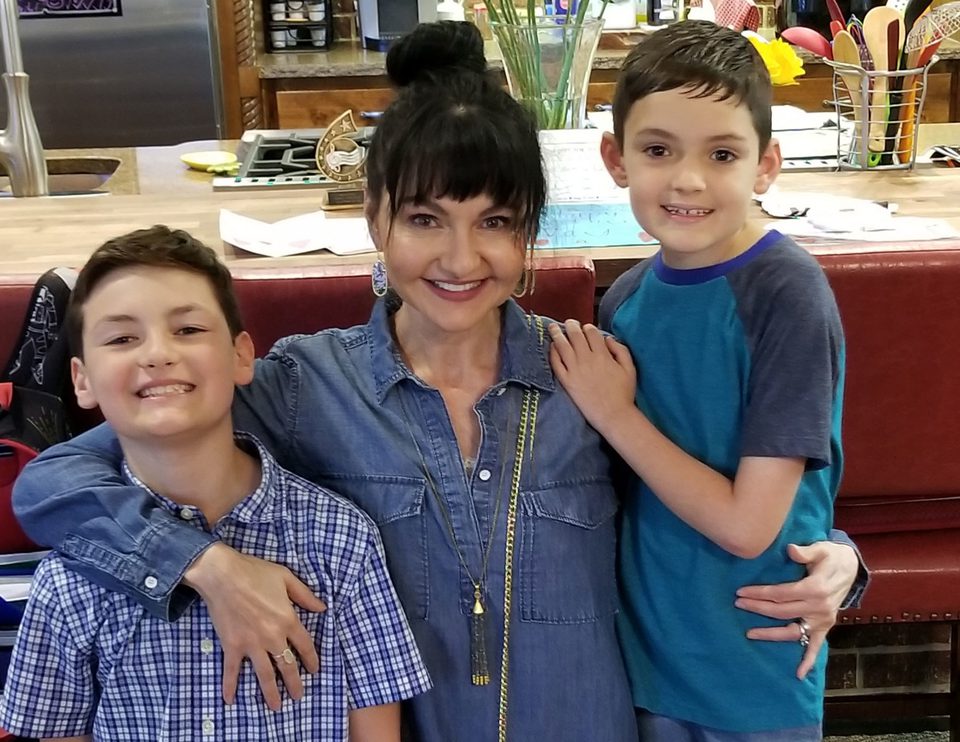Living Like There Is No More Bad News

In 1956, when she was just 35 years old, Aimee DiCicco-Ruhl’s grandmother was diagnosed with breast cancer. At the time, treatments for the disease were rigorous and her doctors weren’t confident she would survive.
“Back then, people hardly talked about breast cancer. My grandmother didn’t hide her experience from me, though. She underwent a mastectomy – her entire right side was just rib cage and scar tissue,” Aimee said. “She was a stunningly beautiful woman, and she wasn’t scared and she wasn’t ashamed.”
Growing up admiring her grandmother’s strength and humor, Aimee didn’t live in fear of a breast cancer diagnosis. But she also didn’t expect, one summer night before her 31st birthday, to find a marble-sized lump in her right breast while changing clothes before dinner.
“I didn’t freak out, actually. I calmly informed my husband, and the next morning I called my gynecologist and scheduled an appointment for a diagnostic mammogram. I really didn’t think it could be cancer.”
The mammogram led to a biopsy, which led to a diagnosis of breast cancer.
“I come from a very large, loving Italian family,” said Aimee. “After the initial shock, they instigated a family phone chain and came to the consensus I had to go to UPMC Magee-Womens Hospital for my treatment, even though it was an hour in traffic away from where we lived.”
At Magee, Aimee asked her breast cancer surgeon how he would treat her if she were his daughter.
“My surgeon told me to have the bi-lateral mastectomy – that surgery was the best option to fully beating the disease.” But Aimee was particularly concerned about whether or not she would still require chemotherapy in addition to the surgery. She was so concerned, in fact, that her Magee team introduced her to oncologist Dr. Adam Brufsky prior to her surgery to address her concerns.
“I couldn’t make an informed treatment decision until I knew if I would need chemotherapy. But Dr. Brufsky – he’s just so calm. He told me that because I had triple negative breast cancer I needed a minimum of eight rounds of chemotherapy. Once I knew that, I was able to move forward with the mastectomy.”
Triple-negative breast cancer is a type of the disease that tests negative for estrogen receptors, progesterone receptors and extra HER2 protein, which means the cancer isn’t fueled by hormones or HER2, and doesn’t respond to drugs developed to target them. It’s still treatable, but its prognosis can be variable.
“When I received the triple negative diagnosis – I felt so angry,” said Aimee. “Out of everything – my age, the treatment I had to undergo – that diagnosis made me the most upset.”
For Aimee, eventually accepting that the path from cancer diagnosis to health wouldn’t be linear gave her a sense of peace. That acceptance, and the support of Dr. Brufsky and his team, got her through her surgery and subsequent treatment.
“I lost my fingernails during chemo – I lost my hair. I suffered from bone pain. I really struggled through parts of my treatment and was very sick. But it was worth it – the treatment worked. I’ve been cancer-free for 17 years, which is just incredible.”
Aimee trusted Dr. Brufksy so much that even when she moved to Dallas for a job promotion, she came back each year to Magee for her annual scans to determine whether her cancer had returned. After her ninth year disease-free, Dr. Brufksy told her the cancer was gone and she didn’t have to see him again.
“He told me I had to start living like there was no more bad news. In nearly a decade of seeing him, I never cried – but I sobbed uncontrollably then,” Aimee said.
Since that moment, Aimee has dedicated her free time to supporting other women going through breast cancer diagnoses and treatment. A regular donor to Magee-Womens Research Institute & Foundation and former board member for Susan G. Komen for the Cure, Aimee has also supported numerous women throughout their treatment.
“I want to wrap my arms around all the women facing this disease, and let them know they aren’t alone,” Aimee said. “Not everyone has a Dr. Brufsky, or a large, supportive family. I want women to know that they can get through this, and that there is love and support available to them.”
Today, Aimee and her husband are raising two sons – unexpected, and very welcome surprises when she thought the hormone turmoil from chemotherapy had taken away her opportunity to become a mom. As a senior vice-president of sales with FedEx, Aimee doesn’t have much spare time, but occasionally, something will remind her of her cancer journey.
“When you go from having cancer – and having so much of your life center around cancer – once it’s gone, it leaves a void,” Aimee said. “In some ways, you almost need to relearn how to live your life – how to live with the idea that there is no more bad news.”
Be the First to Know
Get the latest research, news, events, and more delivered to your inbox.